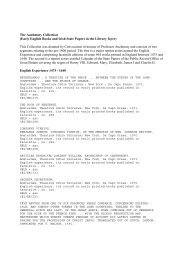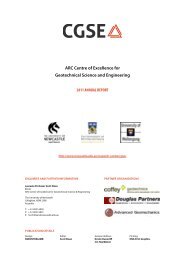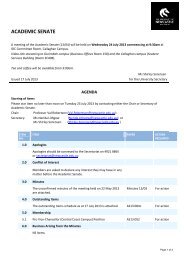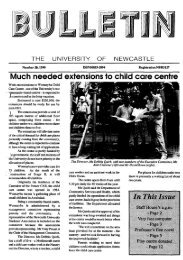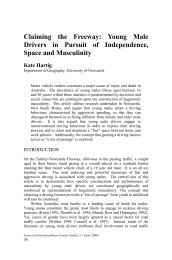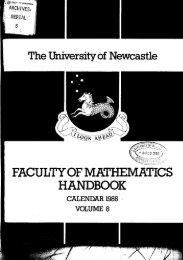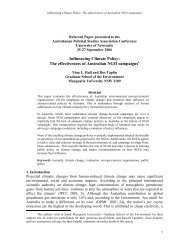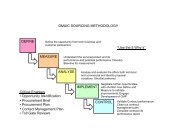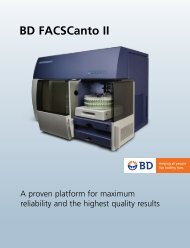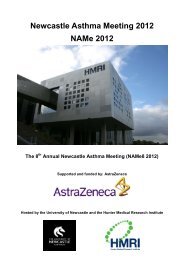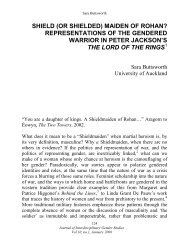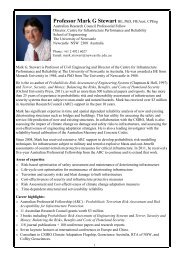Faculty of Mathematic Handbook,1987 - University of Newcastle
Faculty of Mathematic Handbook,1987 - University of Newcastle
Faculty of Mathematic Handbook,1987 - University of Newcastle
Create successful ePaper yourself
Turn your PDF publications into a flip-book with our unique Google optimized e-Paper software.
Bachelor <strong>of</strong> Computer Science<br />
This new degree course, which is being introduced in <strong>1987</strong>, has been designed to provide<br />
students with the opportunity to study a wide range <strong>of</strong> subjects in computer science and<br />
related areas, and thus equip them with an excellent background for a pr<strong>of</strong>essional career<br />
in the computer industry or as a programmer or systems analyst in industry or commerce.<br />
In order to qualify for a B.Comp.Sc. degree, students must pass nine subjects. At least<br />
seven <strong>of</strong> these subjects must be from the Schedule, including three Part I subjects, the<br />
Part III subject Computer Science IlIA and one other Part III subject. In practice this<br />
means that a full-time student will typically take the following subjects:<br />
First year: Computer Science I, <strong>Mathematic</strong>s I, Computer Engineering I, X<br />
Second year: Computer Science II, <strong>Mathematic</strong>s IICS, Y<br />
Third year: Computer Science IlIA, Computer Science IIlB.<br />
X will normally be a Part I subject and Y a Part II subject. Students may take any Part I<br />
subject from the list at the end <strong>of</strong> this section in the slot X. Slot Y will usually be a Part<br />
II subject and can include other Part II subjects from the Schedule. At present the only<br />
such subject is Computer Engineering II, but further subjects may be added to the<br />
Schedule. Alternatively a student can choose a Part II subject from the list below.<br />
Students who wish to transfer from some other degree and who have already taken<br />
Computer Science I and <strong>Mathematic</strong>s I, together with two other Part I subjects, may in<br />
suitable cases be granted standing in these subjects as the X and Y subjects. but then they<br />
must enrol in Computer Engineering I. For such students it would then be impossible to<br />
take Computer Engineering II. For this reason there is an option for them to study<br />
Computer Engineering III rather than Computer Science 11m. The prerequisite for<br />
Computer Engineering III is Computer Engineering I (not II). (Students should note that<br />
they cannot take both Computer Engineering II and Computer Engineering Ill.)<br />
Up to two subjects which are not on the Schedule may be taken as part <strong>of</strong> the course.<br />
Subjects approved for this purpose include:<br />
Accounting I<br />
Biology I<br />
Chemistry I<br />
Part I<br />
Classical Civilisation I<br />
Drama I<br />
Economics IA<br />
English I<br />
French IA or IS<br />
Geography I<br />
Geology I<br />
German IS or IN<br />
Greek I<br />
History I<br />
Japanese I<br />
Latin I<br />
Legal Studies I<br />
Linguistics I<br />
Philosophy I<br />
Physics IA or IE<br />
Psychology I<br />
Sanskrit I<br />
Sociology I<br />
36<br />
Part II<br />
Biology IIA<br />
Chemistry IIA<br />
Classical Civilisation IIA<br />
Economics IIA<br />
Education II<br />
Electronics and Instrumentation II<br />
English ITA<br />
French IIA<br />
Geography IIA<br />
Geology IIA<br />
Gennan IIA<br />
History IIA<br />
Japanese IIA<br />
Legal Studies IIA<br />
<strong>Mathematic</strong>s IIA<br />
Philosophy IIA<br />
Physics II<br />
Psychology IIA<br />
Statistics II<br />
For part-time students the degree patterns described above can be adjusted appropriately<br />
over not more than seven years.<br />
Essay Requirement<br />
Students <strong>of</strong> the B.Comp.Sc. degree must complete an essay on some aspect <strong>of</strong> the history<br />
or philosophy <strong>of</strong> computer science or the social issues raised by computer technology.<br />
This will normally be completed in a student's second or third year. Details will be<br />
discussed at the beginning <strong>of</strong> the Computer Science II lectures each year. This involves<br />
reading several books and articles in preparation, so it should not be left until the last<br />
minute. The degree cannot be awarded until the essay has been satisfactorily completed.<br />
Students Wishing to Transfer from other Degrees<br />
Standing for subjects taken as part <strong>of</strong> other degree courses should be discussed in the first<br />
instance with the Head <strong>of</strong> the Department <strong>of</strong> Computer Science.<br />
Bachelor <strong>of</strong> Computer Science (Honours)<br />
This is a separate degree from the Bachelor <strong>of</strong> Computer Science, which may be taken<br />
full-time over one year or part-time over two years. Entry requires at least Computer<br />
Science IlIA (or its equivalent) with at least a credit result. It consists <strong>of</strong> the single<br />
subject Computer Science IV, which includes a major project in addition to lecture topics<br />
(which will include topics from Computer Science IUB for students who have not already<br />
taken these).<br />
Diploma in Computer Science<br />
A post-graduate diploma, the Diploma in Computer Science has undergone a complete<br />
revision which takes effect in <strong>1987</strong>. The new regulations assume that students already<br />
have a sound knowledge <strong>of</strong> basic programming in Pascal. Students who cannot<br />
demonstrate that they have such a background must ftrst complete the preliminary subject<br />
Introduction to Programming (or Computer Science I) before taking the main subjects.<br />
The new regulations basically require students to complete subjects consisting <strong>of</strong> about<br />
half the second year and half the third year topics <strong>of</strong> the Bachelor <strong>of</strong> Computer Science<br />
degree (or exceptionally a full third year for students with a suitable background),<br />
together with a project involving about 100 hours <strong>of</strong> work.<br />
The diploma is intended as a part-time course and prerequisites make it difficult to<br />
complete in a single full-time year, unless the candidate already has a good background<br />
(e.g. having previously completed Computer Science IT).<br />
Transition Arrangements<br />
Students who enrolled in the Diploma before <strong>1987</strong> should consult the Diploma Coordinator<br />
to detennine whether they should continue under the old regulations or transfer<br />
to the new. In the latter case standing may be given for subjects previously passed.<br />
Master <strong>of</strong> Computing<br />
This is a new post-graduate coursework masters degree which requires two years full-time<br />
(or the equivalent part-time) study. To qualify for the M.Comp. a student must pass the<br />
subject Computer Science IVM, which involves about one full year <strong>of</strong> coursework<br />
(normally based on that <strong>of</strong> Computer Science IUB and IV) together with a very<br />
substantial one-year research related project, usually associated with one <strong>of</strong> the research<br />
projects being carried out in the Department <strong>of</strong> Computer Science.<br />
Applications will be considered from graduates who have completed Computer Science<br />
IlIA or its equivalent (e.g. including the Diploma in Computer Science). The course<br />
commences at the beginning <strong>of</strong> the academic year.<br />
37



